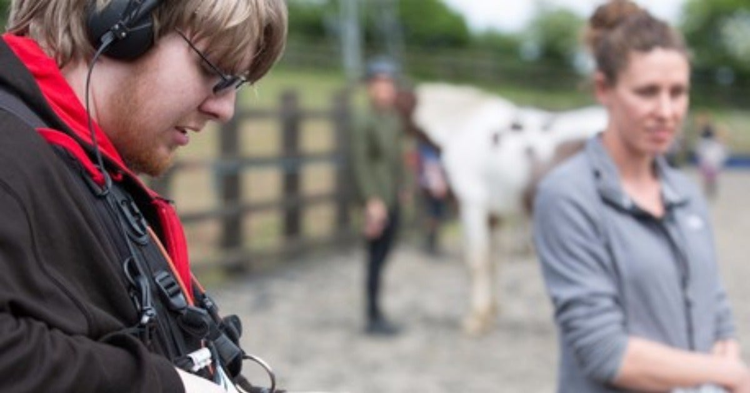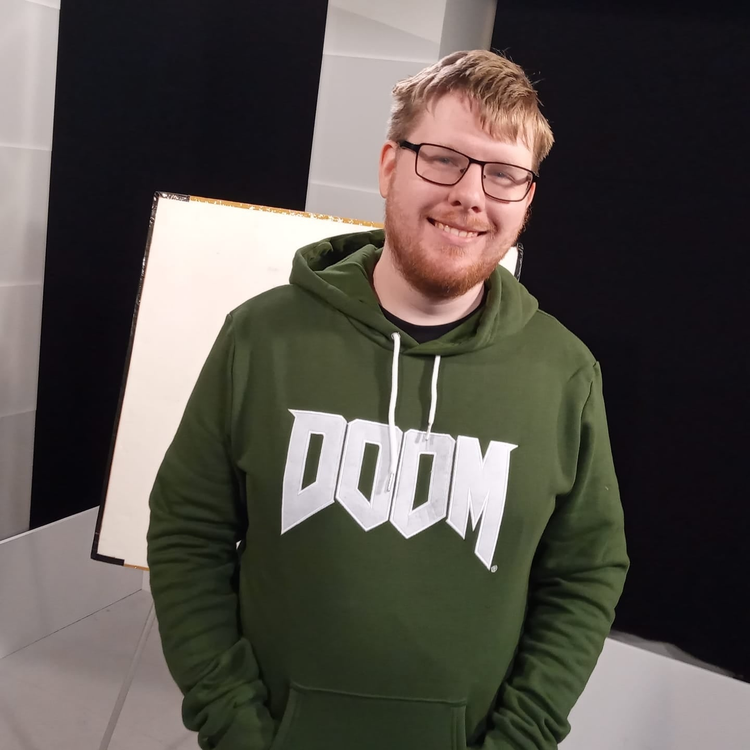How tech opened up a world of creativity for neurodiverse Hayden Stevens

Hayden Stevens
Gamer, anime fan and tech obsessive, MCR Engineer Hayden Stevens has carved himself the perfect niche, helping bring Esports tournaments to air, working on games and creating his own content. Here he speaks about his own experiences being neurodiverse in the creative industries, and the importance of inclusivity in the arts.
Stevens loves technology, and not just a little bit; his backdrop for video calls is a cornucopia of kit, keyboards, cables, wires, widgets and wotsits. Since being plonked in front of a computer at the age of three by his father, Stevens has had a lifelong fascination with learning about tech and how it can be harnessed for creativity. Within the first week of his Film, Radio & Television Studies degree at Canterbury Christ Church University he realised he’d found the perfect spot, where he had “basically everything that I wanted in life, being able to just play with the toys and learn how they worked.” Having found his niche at university, he says, “every opportunity I got I did sound, sound, sound.”

Hayden Stevens
Getting his start
Stevens, who self-identifies as neurodiverse, had some early success, having secured work experience with the video mapping company Butch Auntie. That placement saw him begin realising the transition from student to professional. However, it was when he found Mama Youth training, which aims to help underrepresented groups get a start in TV, that “it all really started to take off.” Seeing the opportunity to train with Sky and the BBC, his initial reaction was that it, “sounded way too good to be true, maybe it’s a scam?”
“Seeing my name in the credits for the first time on actual, literal Sky One was something I can't begin to describe. It was incredible.”
Hayden Stevens, MCR Engineer
It wasn’t, and fortunately Stevens threw caution to the wind, and began what was to be a transformational experience. For the next few months he and the other trainees dedicated themselves to producing their own show, What’s Up TV; six half hour episodes to be aired on Sky One. In fact, Stevens even pitched his own segment, which after plenty of elbow grease, including several rewrites, made it to air. As Stevens puts it; “It was 24 people with little-to-no actual experience in TV and we smashed out possibly one of the best seasons of that show. In 10 weeks!” Already convinced by the experience, Stevens describes “seeing my name in the credits for the first time on actual, literal Sky One was something I can’t begin to describe. It was incredible.”
Creating a career
From that eye-opening beginning, Stevens has gone out to carve himself a career that really suits him. A gamer himself, Stevens discovered the joys of Esports while at university; “I loved gaming and production, so the presentation of both together was amazing.” Now in position as MCR Engineer at Ginx Esports TV, Stevens’s day-to-day life is focused on everything from drawing up technical specs for shows, to mixing audio, and any other roles that aren’t nailed down. “I’m in a constant state of R&D, personally and professionally. I’m always looking to learn about new ways that Esports shows are produced, and then incorporating those into our own productions.”
That willingness to learn is a common theme for Stevens: “I actually streamed myself learning After Effects in real time, following a tutorial. In three hours I’d built an animated portal, and that was a real turning point.” He has released several YouTube videos featuring the range of skills he’s developed, including editing on Premiere Pro, camera work, and using Adobe Audition to refine sound. Recent experiments have seen him dabbling with 3D: “That’s something I would have spent hours trying to figure out a couple years ago. Now it took me 10 minutes in After Effects.”
“I'm in a constant state of R&D, personally and professionally.”
Hayden Stevens, MCR Engineer
Ever the self-starter, when Stevens saw that Studio Coattails was working on a game he was interested in, he simply got in touch to see if they needed any help with the sound. They did, they liked what he produced, and he’s already completed work for them and is in the process of doing more.

Hayden Stevens
Embracing diversity
That kind of motivation can give the impression that things come easily; the reality of course is less straight forward. As Stevens explains, “I have ADHD and Asperger’s syndrome, and there’s not a lot of representation of people like me in media.” Though he prefers not to “make a big deal out of it,” he does make sure it’s something he spells out to potential employers, knowing that how they respond is a good indicator of how comfortable he will be working there. While in general his experiences have been positive, he does acknowledge that “there is an insensitivity from some people, because their misconceptions are based on the media’s projection of autism.” The fact that there is “a stigma around people with autism” is something Stevens finds particularly frustrating, since as he’s seen, those who do find a way into the creative industries tend to thrive if given the right support.
As Stevens explains; “a lot of work needs to be done with bringing more diversity to the industry,” but there are positive signs: in terms of educating the public, and in creating visible role models, “the fact that CBeebies has taken on a presenter with Down’s Syndrome is massively important.” That inclusivity is also a huge opportunity for the industry: “Look at London for example, this wonderful crucible where cultures meet, mix and merge into new and wonderful things.”
“To do my best work I have to be myself, which is why I’ve tried to be as honest about myself and with myself as I possibly can.”
Hayden Stevens, MCR Engineer
Pondering advice to other neurodiverse young people considering the creative industries, Stevens advises the importance of “knowing yourself and knowing your weaknesses. If you know what your weaknesses are, you can work on them to a degree.” For him that meant learning to communicate better, practising reading facial expressions and developing his sense of empathy. Having said which, he also knows that “to do my best work I have to be myself, which is why I’ve tried to be as honest about myself and with myself as I possibly can.”
Hear more from diverse creators at Adobe Diverse Voices and check out Adobe Premiere Pro to you bring your stories to life.